Business Law Report: Legal Analysis of Chiclets plc. and Joe's Cases
VerifiedAdded on 2020/12/30
|9
|2474
|246
Report
AI Summary
This report provides a detailed analysis of two business law cases. The first case involves Chiclets plc. and Delta Delivery Ltd., examining the legality of a contract term that attempts to avoid liability, focusing on the Unfair Contract Terms Act 1977 and the incorporation of exclusion clauses. The second case concerns Joe's injury and his claim against Delta Delivery Ltd., exploring the concept of duty of care, breach of duty, and the law of torts, including negligence. The report considers potential defenses Delta Delivery Ltd. might raise, such as Joe's alleged contributory negligence. The analysis incorporates relevant case law such as L'Estrange v Graucob, Olley v Marlborough Court Ltd., and Donoghue v Stevenson, to provide a comprehensive legal assessment of the scenarios and potential outcomes.
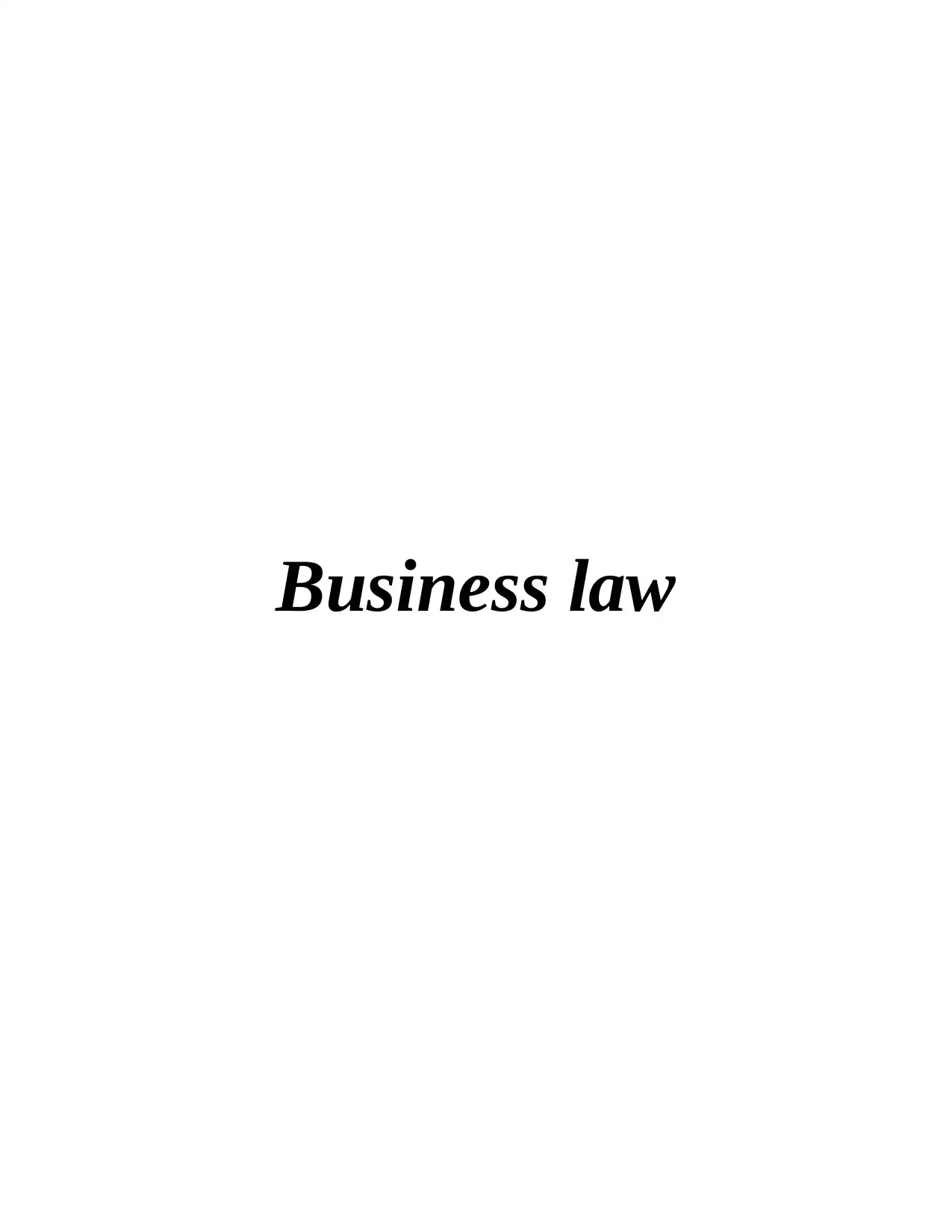
Business law
Paraphrase This Document
Need a fresh take? Get an instant paraphrase of this document with our AI Paraphraser
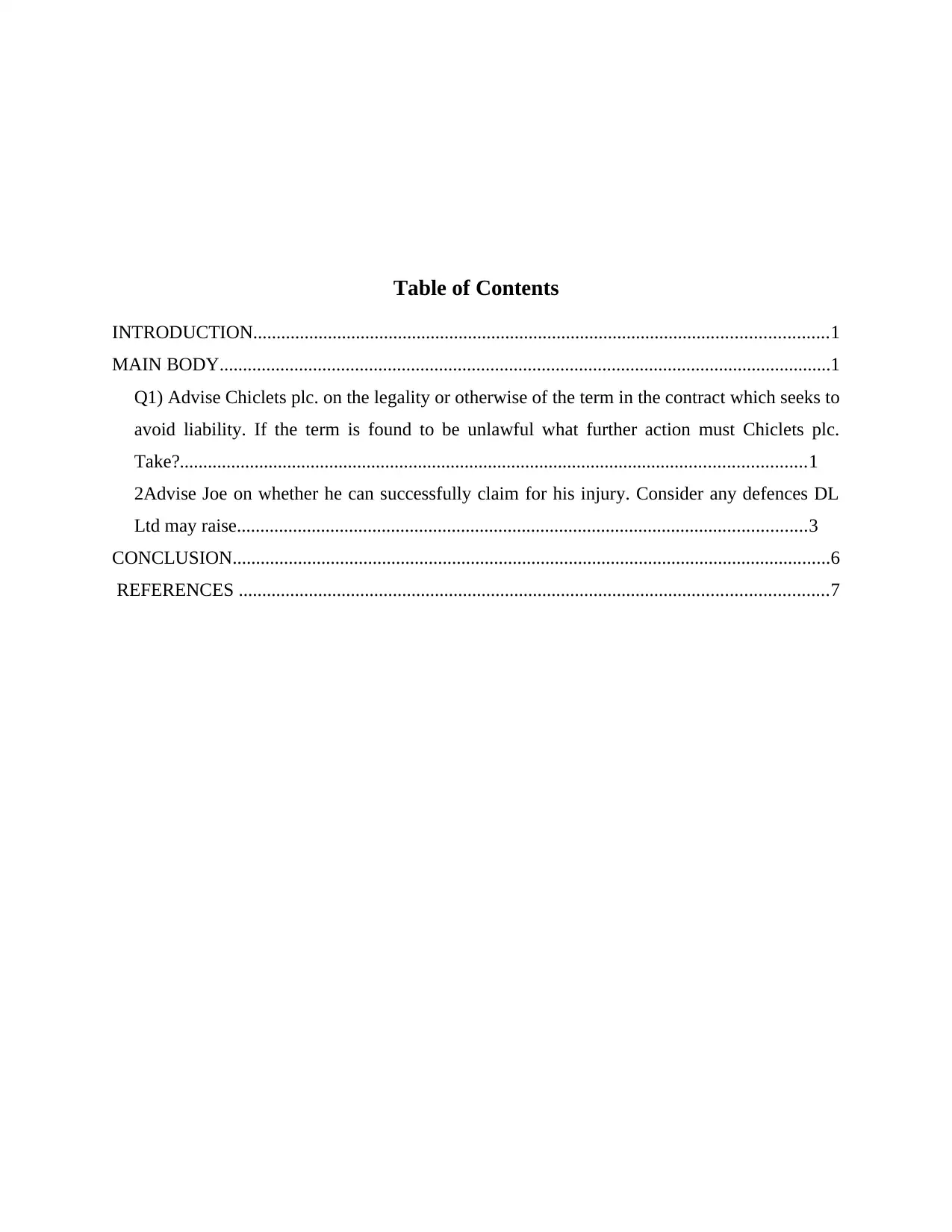
Table of Contents
INTRODUCTION...........................................................................................................................1
MAIN BODY...................................................................................................................................1
Q1) Advise Chiclets plc. on the legality or otherwise of the term in the contract which seeks to
avoid liability. If the term is found to be unlawful what further action must Chiclets plc.
Take?......................................................................................................................................1
2Advise Joe on whether he can successfully claim for his injury. Consider any defences DL
Ltd may raise..........................................................................................................................3
CONCLUSION................................................................................................................................6
REFERENCES ..............................................................................................................................7
INTRODUCTION...........................................................................................................................1
MAIN BODY...................................................................................................................................1
Q1) Advise Chiclets plc. on the legality or otherwise of the term in the contract which seeks to
avoid liability. If the term is found to be unlawful what further action must Chiclets plc.
Take?......................................................................................................................................1
2Advise Joe on whether he can successfully claim for his injury. Consider any defences DL
Ltd may raise..........................................................................................................................3
CONCLUSION................................................................................................................................6
REFERENCES ..............................................................................................................................7
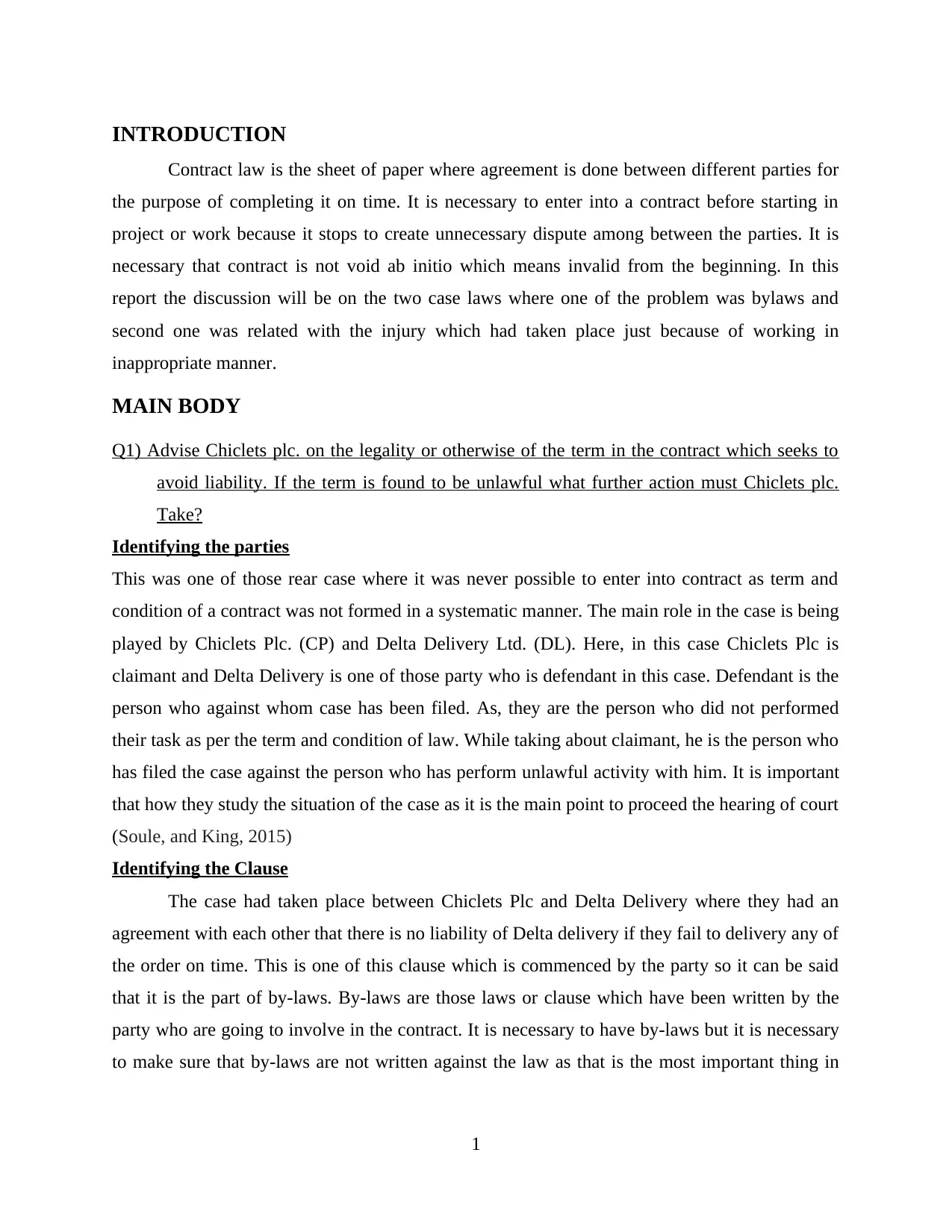
INTRODUCTION
Contract law is the sheet of paper where agreement is done between different parties for
the purpose of completing it on time. It is necessary to enter into a contract before starting in
project or work because it stops to create unnecessary dispute among between the parties. It is
necessary that contract is not void ab initio which means invalid from the beginning. In this
report the discussion will be on the two case laws where one of the problem was bylaws and
second one was related with the injury which had taken place just because of working in
inappropriate manner.
MAIN BODY
Q1) Advise Chiclets plc. on the legality or otherwise of the term in the contract which seeks to
avoid liability. If the term is found to be unlawful what further action must Chiclets plc.
Take?
Identifying the parties
This was one of those rear case where it was never possible to enter into contract as term and
condition of a contract was not formed in a systematic manner. The main role in the case is being
played by Chiclets Plc. (CP) and Delta Delivery Ltd. (DL). Here, in this case Chiclets Plc is
claimant and Delta Delivery is one of those party who is defendant in this case. Defendant is the
person who against whom case has been filed. As, they are the person who did not performed
their task as per the term and condition of law. While taking about claimant, he is the person who
has filed the case against the person who has perform unlawful activity with him. It is important
that how they study the situation of the case as it is the main point to proceed the hearing of court
(Soule, and King, 2015)
Identifying the Clause
The case had taken place between Chiclets Plc and Delta Delivery where they had an
agreement with each other that there is no liability of Delta delivery if they fail to delivery any of
the order on time. This is one of this clause which is commenced by the party so it can be said
that it is the part of by-laws. By-laws are those laws or clause which have been written by the
party who are going to involve in the contract. It is necessary to have by-laws but it is necessary
to make sure that by-laws are not written against the law as that is the most important thing in
1
Contract law is the sheet of paper where agreement is done between different parties for
the purpose of completing it on time. It is necessary to enter into a contract before starting in
project or work because it stops to create unnecessary dispute among between the parties. It is
necessary that contract is not void ab initio which means invalid from the beginning. In this
report the discussion will be on the two case laws where one of the problem was bylaws and
second one was related with the injury which had taken place just because of working in
inappropriate manner.
MAIN BODY
Q1) Advise Chiclets plc. on the legality or otherwise of the term in the contract which seeks to
avoid liability. If the term is found to be unlawful what further action must Chiclets plc.
Take?
Identifying the parties
This was one of those rear case where it was never possible to enter into contract as term and
condition of a contract was not formed in a systematic manner. The main role in the case is being
played by Chiclets Plc. (CP) and Delta Delivery Ltd. (DL). Here, in this case Chiclets Plc is
claimant and Delta Delivery is one of those party who is defendant in this case. Defendant is the
person who against whom case has been filed. As, they are the person who did not performed
their task as per the term and condition of law. While taking about claimant, he is the person who
has filed the case against the person who has perform unlawful activity with him. It is important
that how they study the situation of the case as it is the main point to proceed the hearing of court
(Soule, and King, 2015)
Identifying the Clause
The case had taken place between Chiclets Plc and Delta Delivery where they had an
agreement with each other that there is no liability of Delta delivery if they fail to delivery any of
the order on time. This is one of this clause which is commenced by the party so it can be said
that it is the part of by-laws. By-laws are those laws or clause which have been written by the
party who are going to involve in the contract. It is necessary to have by-laws but it is necessary
to make sure that by-laws are not written against the law as that is the most important thing in
1
⊘ This is a preview!⊘
Do you want full access?
Subscribe today to unlock all pages.

Trusted by 1+ million students worldwide
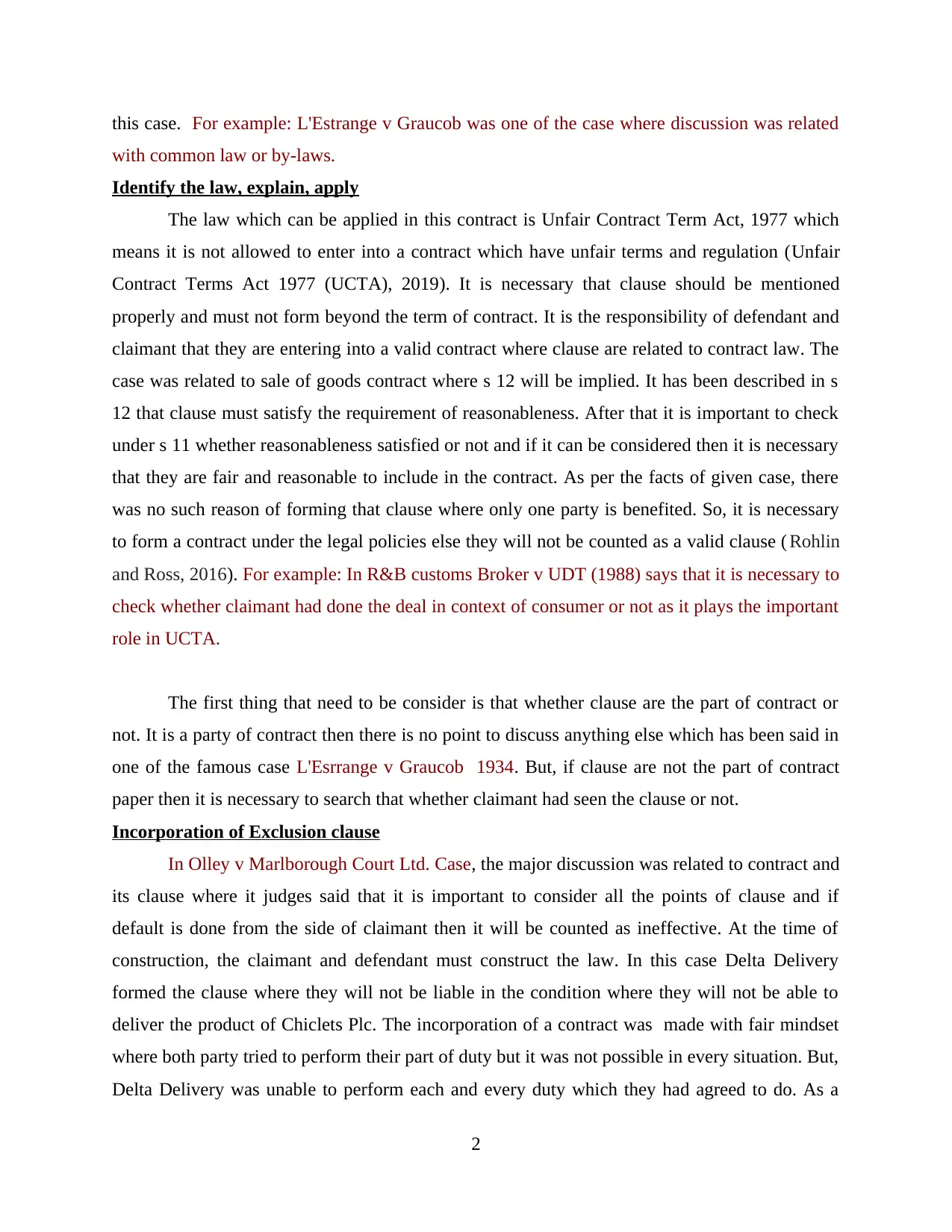
this case. For example: L'Estrange v Graucob was one of the case where discussion was related
with common law or by-laws.
Identify the law, explain, apply
The law which can be applied in this contract is Unfair Contract Term Act, 1977 which
means it is not allowed to enter into a contract which have unfair terms and regulation (Unfair
Contract Terms Act 1977 (UCTA), 2019). It is necessary that clause should be mentioned
properly and must not form beyond the term of contract. It is the responsibility of defendant and
claimant that they are entering into a valid contract where clause are related to contract law. The
case was related to sale of goods contract where s 12 will be implied. It has been described in s
12 that clause must satisfy the requirement of reasonableness. After that it is important to check
under s 11 whether reasonableness satisfied or not and if it can be considered then it is necessary
that they are fair and reasonable to include in the contract. As per the facts of given case, there
was no such reason of forming that clause where only one party is benefited. So, it is necessary
to form a contract under the legal policies else they will not be counted as a valid clause ( Rohlin
and Ross, 2016). For example: In R&B customs Broker v UDT (1988) says that it is necessary to
check whether claimant had done the deal in context of consumer or not as it plays the important
role in UCTA.
The first thing that need to be consider is that whether clause are the part of contract or
not. It is a party of contract then there is no point to discuss anything else which has been said in
one of the famous case L'Esrrange v Graucob 1934. But, if clause are not the part of contract
paper then it is necessary to search that whether claimant had seen the clause or not.
Incorporation of Exclusion clause
In Olley v Marlborough Court Ltd. Case, the major discussion was related to contract and
its clause where it judges said that it is important to consider all the points of clause and if
default is done from the side of claimant then it will be counted as ineffective. At the time of
construction, the claimant and defendant must construct the law. In this case Delta Delivery
formed the clause where they will not be liable in the condition where they will not be able to
deliver the product of Chiclets Plc. The incorporation of a contract was made with fair mindset
where both party tried to perform their part of duty but it was not possible in every situation. But,
Delta Delivery was unable to perform each and every duty which they had agreed to do. As a
2
with common law or by-laws.
Identify the law, explain, apply
The law which can be applied in this contract is Unfair Contract Term Act, 1977 which
means it is not allowed to enter into a contract which have unfair terms and regulation (Unfair
Contract Terms Act 1977 (UCTA), 2019). It is necessary that clause should be mentioned
properly and must not form beyond the term of contract. It is the responsibility of defendant and
claimant that they are entering into a valid contract where clause are related to contract law. The
case was related to sale of goods contract where s 12 will be implied. It has been described in s
12 that clause must satisfy the requirement of reasonableness. After that it is important to check
under s 11 whether reasonableness satisfied or not and if it can be considered then it is necessary
that they are fair and reasonable to include in the contract. As per the facts of given case, there
was no such reason of forming that clause where only one party is benefited. So, it is necessary
to form a contract under the legal policies else they will not be counted as a valid clause ( Rohlin
and Ross, 2016). For example: In R&B customs Broker v UDT (1988) says that it is necessary to
check whether claimant had done the deal in context of consumer or not as it plays the important
role in UCTA.
The first thing that need to be consider is that whether clause are the part of contract or
not. It is a party of contract then there is no point to discuss anything else which has been said in
one of the famous case L'Esrrange v Graucob 1934. But, if clause are not the part of contract
paper then it is necessary to search that whether claimant had seen the clause or not.
Incorporation of Exclusion clause
In Olley v Marlborough Court Ltd. Case, the major discussion was related to contract and
its clause where it judges said that it is important to consider all the points of clause and if
default is done from the side of claimant then it will be counted as ineffective. At the time of
construction, the claimant and defendant must construct the law. In this case Delta Delivery
formed the clause where they will not be liable in the condition where they will not be able to
deliver the product of Chiclets Plc. The incorporation of a contract was made with fair mindset
where both party tried to perform their part of duty but it was not possible in every situation. But,
Delta Delivery was unable to perform each and every duty which they had agreed to do. As a
2
Paraphrase This Document
Need a fresh take? Get an instant paraphrase of this document with our AI Paraphraser
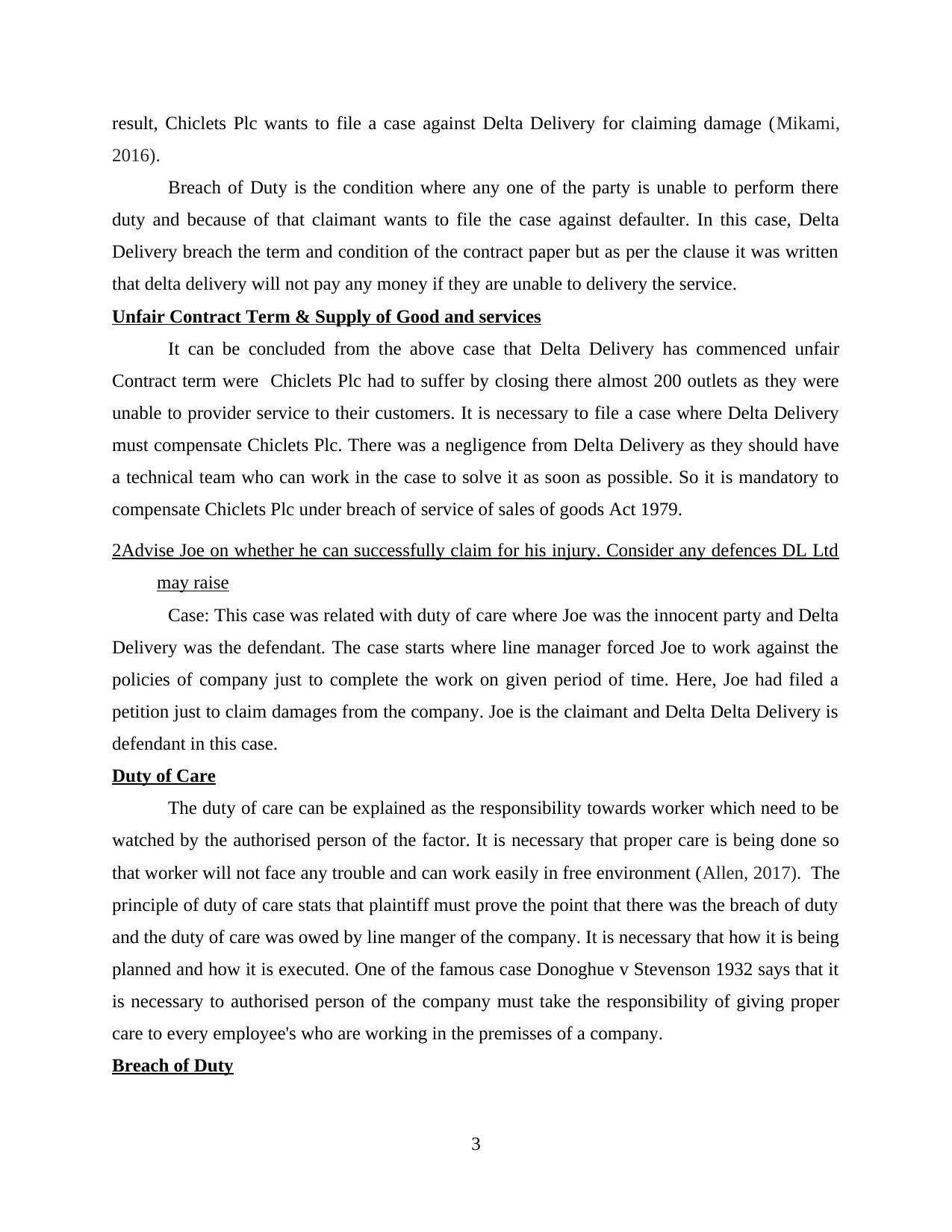
result, Chiclets Plc wants to file a case against Delta Delivery for claiming damage (Mikami,
2016).
Breach of Duty is the condition where any one of the party is unable to perform there
duty and because of that claimant wants to file the case against defaulter. In this case, Delta
Delivery breach the term and condition of the contract paper but as per the clause it was written
that delta delivery will not pay any money if they are unable to delivery the service.
Unfair Contract Term & Supply of Good and services
It can be concluded from the above case that Delta Delivery has commenced unfair
Contract term were Chiclets Plc had to suffer by closing there almost 200 outlets as they were
unable to provider service to their customers. It is necessary to file a case where Delta Delivery
must compensate Chiclets Plc. There was a negligence from Delta Delivery as they should have
a technical team who can work in the case to solve it as soon as possible. So it is mandatory to
compensate Chiclets Plc under breach of service of sales of goods Act 1979.
2Advise Joe on whether he can successfully claim for his injury. Consider any defences DL Ltd
may raise
Case: This case was related with duty of care where Joe was the innocent party and Delta
Delivery was the defendant. The case starts where line manager forced Joe to work against the
policies of company just to complete the work on given period of time. Here, Joe had filed a
petition just to claim damages from the company. Joe is the claimant and Delta Delta Delivery is
defendant in this case.
Duty of Care
The duty of care can be explained as the responsibility towards worker which need to be
watched by the authorised person of the factor. It is necessary that proper care is being done so
that worker will not face any trouble and can work easily in free environment (Allen, 2017). The
principle of duty of care stats that plaintiff must prove the point that there was the breach of duty
and the duty of care was owed by line manger of the company. It is necessary that how it is being
planned and how it is executed. One of the famous case Donoghue v Stevenson 1932 says that it
is necessary to authorised person of the company must take the responsibility of giving proper
care to every employee's who are working in the premisses of a company.
Breach of Duty
3
2016).
Breach of Duty is the condition where any one of the party is unable to perform there
duty and because of that claimant wants to file the case against defaulter. In this case, Delta
Delivery breach the term and condition of the contract paper but as per the clause it was written
that delta delivery will not pay any money if they are unable to delivery the service.
Unfair Contract Term & Supply of Good and services
It can be concluded from the above case that Delta Delivery has commenced unfair
Contract term were Chiclets Plc had to suffer by closing there almost 200 outlets as they were
unable to provider service to their customers. It is necessary to file a case where Delta Delivery
must compensate Chiclets Plc. There was a negligence from Delta Delivery as they should have
a technical team who can work in the case to solve it as soon as possible. So it is mandatory to
compensate Chiclets Plc under breach of service of sales of goods Act 1979.
2Advise Joe on whether he can successfully claim for his injury. Consider any defences DL Ltd
may raise
Case: This case was related with duty of care where Joe was the innocent party and Delta
Delivery was the defendant. The case starts where line manager forced Joe to work against the
policies of company just to complete the work on given period of time. Here, Joe had filed a
petition just to claim damages from the company. Joe is the claimant and Delta Delta Delivery is
defendant in this case.
Duty of Care
The duty of care can be explained as the responsibility towards worker which need to be
watched by the authorised person of the factor. It is necessary that proper care is being done so
that worker will not face any trouble and can work easily in free environment (Allen, 2017). The
principle of duty of care stats that plaintiff must prove the point that there was the breach of duty
and the duty of care was owed by line manger of the company. It is necessary that how it is being
planned and how it is executed. One of the famous case Donoghue v Stevenson 1932 says that it
is necessary to authorised person of the company must take the responsibility of giving proper
care to every employee's who are working in the premisses of a company.
Breach of Duty
3
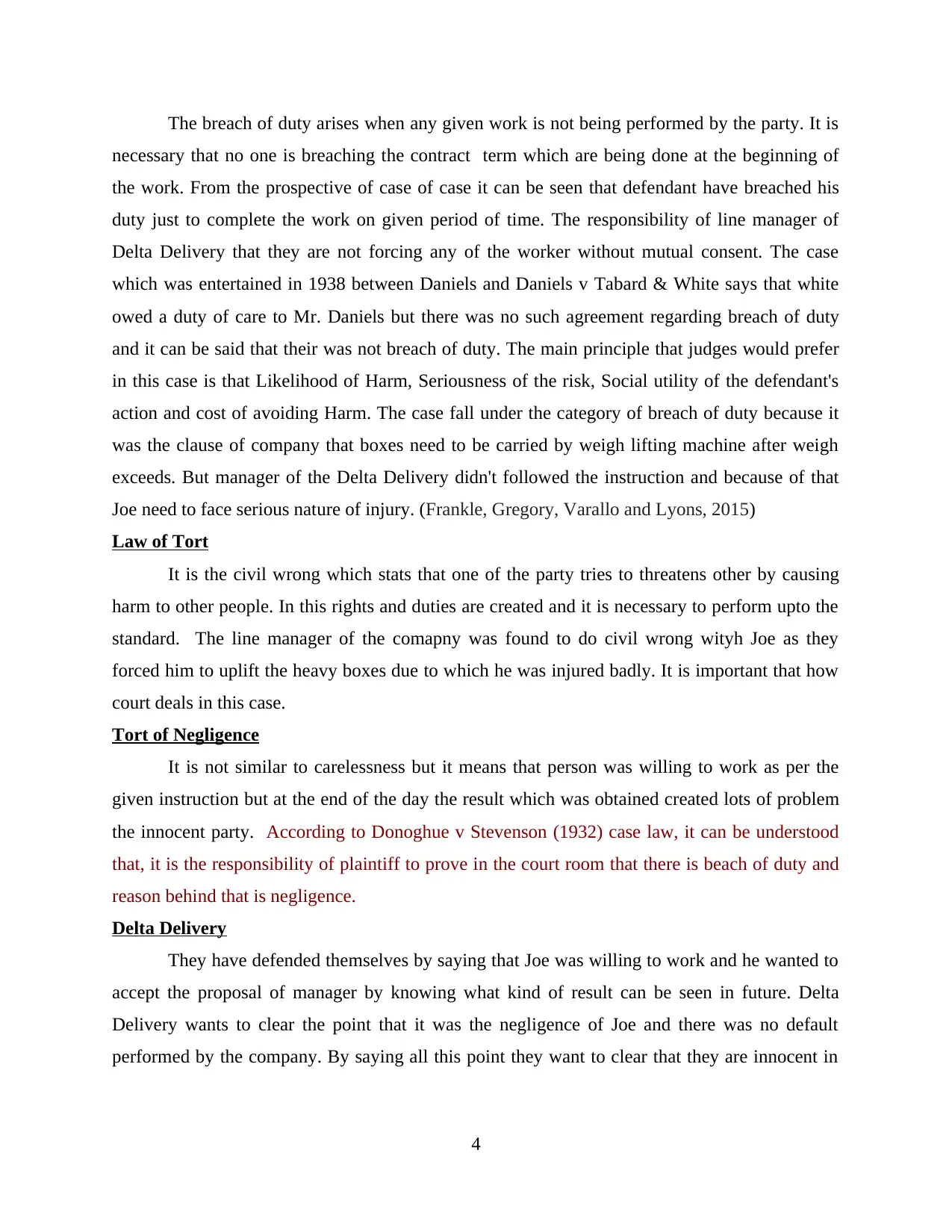
The breach of duty arises when any given work is not being performed by the party. It is
necessary that no one is breaching the contract term which are being done at the beginning of
the work. From the prospective of case of case it can be seen that defendant have breached his
duty just to complete the work on given period of time. The responsibility of line manager of
Delta Delivery that they are not forcing any of the worker without mutual consent. The case
which was entertained in 1938 between Daniels and Daniels v Tabard & White says that white
owed a duty of care to Mr. Daniels but there was no such agreement regarding breach of duty
and it can be said that their was not breach of duty. The main principle that judges would prefer
in this case is that Likelihood of Harm, Seriousness of the risk, Social utility of the defendant's
action and cost of avoiding Harm. The case fall under the category of breach of duty because it
was the clause of company that boxes need to be carried by weigh lifting machine after weigh
exceeds. But manager of the Delta Delivery didn't followed the instruction and because of that
Joe need to face serious nature of injury. (Frankle, Gregory, Varallo and Lyons, 2015)
Law of Tort
It is the civil wrong which stats that one of the party tries to threatens other by causing
harm to other people. In this rights and duties are created and it is necessary to perform upto the
standard. The line manager of the comapny was found to do civil wrong wityh Joe as they
forced him to uplift the heavy boxes due to which he was injured badly. It is important that how
court deals in this case.
Tort of Negligence
It is not similar to carelessness but it means that person was willing to work as per the
given instruction but at the end of the day the result which was obtained created lots of problem
the innocent party. According to Donoghue v Stevenson (1932) case law, it can be understood
that, it is the responsibility of plaintiff to prove in the court room that there is beach of duty and
reason behind that is negligence.
Delta Delivery
They have defended themselves by saying that Joe was willing to work and he wanted to
accept the proposal of manager by knowing what kind of result can be seen in future. Delta
Delivery wants to clear the point that it was the negligence of Joe and there was no default
performed by the company. By saying all this point they want to clear that they are innocent in
4
necessary that no one is breaching the contract term which are being done at the beginning of
the work. From the prospective of case of case it can be seen that defendant have breached his
duty just to complete the work on given period of time. The responsibility of line manager of
Delta Delivery that they are not forcing any of the worker without mutual consent. The case
which was entertained in 1938 between Daniels and Daniels v Tabard & White says that white
owed a duty of care to Mr. Daniels but there was no such agreement regarding breach of duty
and it can be said that their was not breach of duty. The main principle that judges would prefer
in this case is that Likelihood of Harm, Seriousness of the risk, Social utility of the defendant's
action and cost of avoiding Harm. The case fall under the category of breach of duty because it
was the clause of company that boxes need to be carried by weigh lifting machine after weigh
exceeds. But manager of the Delta Delivery didn't followed the instruction and because of that
Joe need to face serious nature of injury. (Frankle, Gregory, Varallo and Lyons, 2015)
Law of Tort
It is the civil wrong which stats that one of the party tries to threatens other by causing
harm to other people. In this rights and duties are created and it is necessary to perform upto the
standard. The line manager of the comapny was found to do civil wrong wityh Joe as they
forced him to uplift the heavy boxes due to which he was injured badly. It is important that how
court deals in this case.
Tort of Negligence
It is not similar to carelessness but it means that person was willing to work as per the
given instruction but at the end of the day the result which was obtained created lots of problem
the innocent party. According to Donoghue v Stevenson (1932) case law, it can be understood
that, it is the responsibility of plaintiff to prove in the court room that there is beach of duty and
reason behind that is negligence.
Delta Delivery
They have defended themselves by saying that Joe was willing to work and he wanted to
accept the proposal of manager by knowing what kind of result can be seen in future. Delta
Delivery wants to clear the point that it was the negligence of Joe and there was no default
performed by the company. By saying all this point they want to clear that they are innocent in
4
⊘ This is a preview!⊘
Do you want full access?
Subscribe today to unlock all pages.

Trusted by 1+ million students worldwide
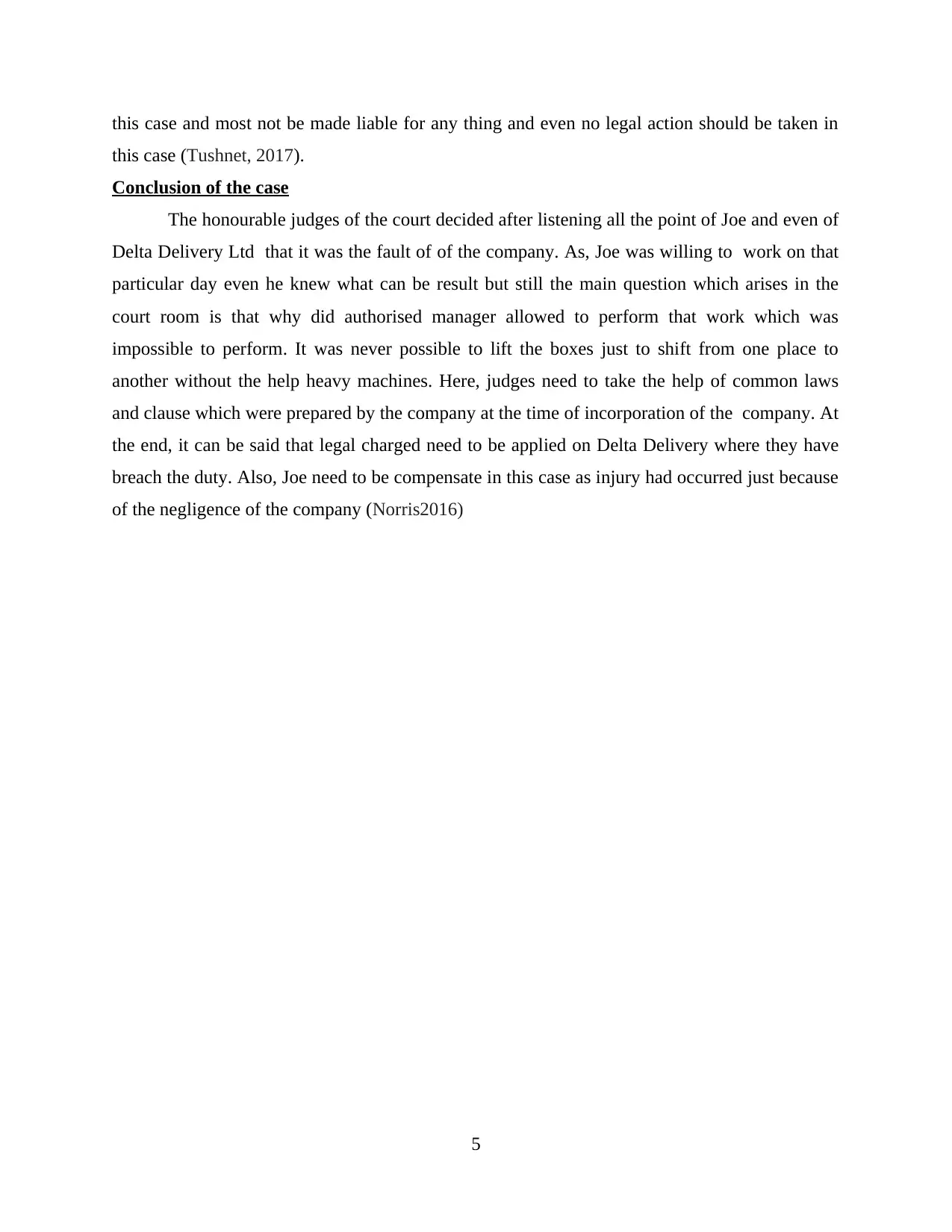
this case and most not be made liable for any thing and even no legal action should be taken in
this case (Tushnet, 2017).
Conclusion of the case
The honourable judges of the court decided after listening all the point of Joe and even of
Delta Delivery Ltd that it was the fault of of the company. As, Joe was willing to work on that
particular day even he knew what can be result but still the main question which arises in the
court room is that why did authorised manager allowed to perform that work which was
impossible to perform. It was never possible to lift the boxes just to shift from one place to
another without the help heavy machines. Here, judges need to take the help of common laws
and clause which were prepared by the company at the time of incorporation of the company. At
the end, it can be said that legal charged need to be applied on Delta Delivery where they have
breach the duty. Also, Joe need to be compensate in this case as injury had occurred just because
of the negligence of the company (Norris2016)
5
this case (Tushnet, 2017).
Conclusion of the case
The honourable judges of the court decided after listening all the point of Joe and even of
Delta Delivery Ltd that it was the fault of of the company. As, Joe was willing to work on that
particular day even he knew what can be result but still the main question which arises in the
court room is that why did authorised manager allowed to perform that work which was
impossible to perform. It was never possible to lift the boxes just to shift from one place to
another without the help heavy machines. Here, judges need to take the help of common laws
and clause which were prepared by the company at the time of incorporation of the company. At
the end, it can be said that legal charged need to be applied on Delta Delivery where they have
breach the duty. Also, Joe need to be compensate in this case as injury had occurred just because
of the negligence of the company (Norris2016)
5
Paraphrase This Document
Need a fresh take? Get an instant paraphrase of this document with our AI Paraphraser
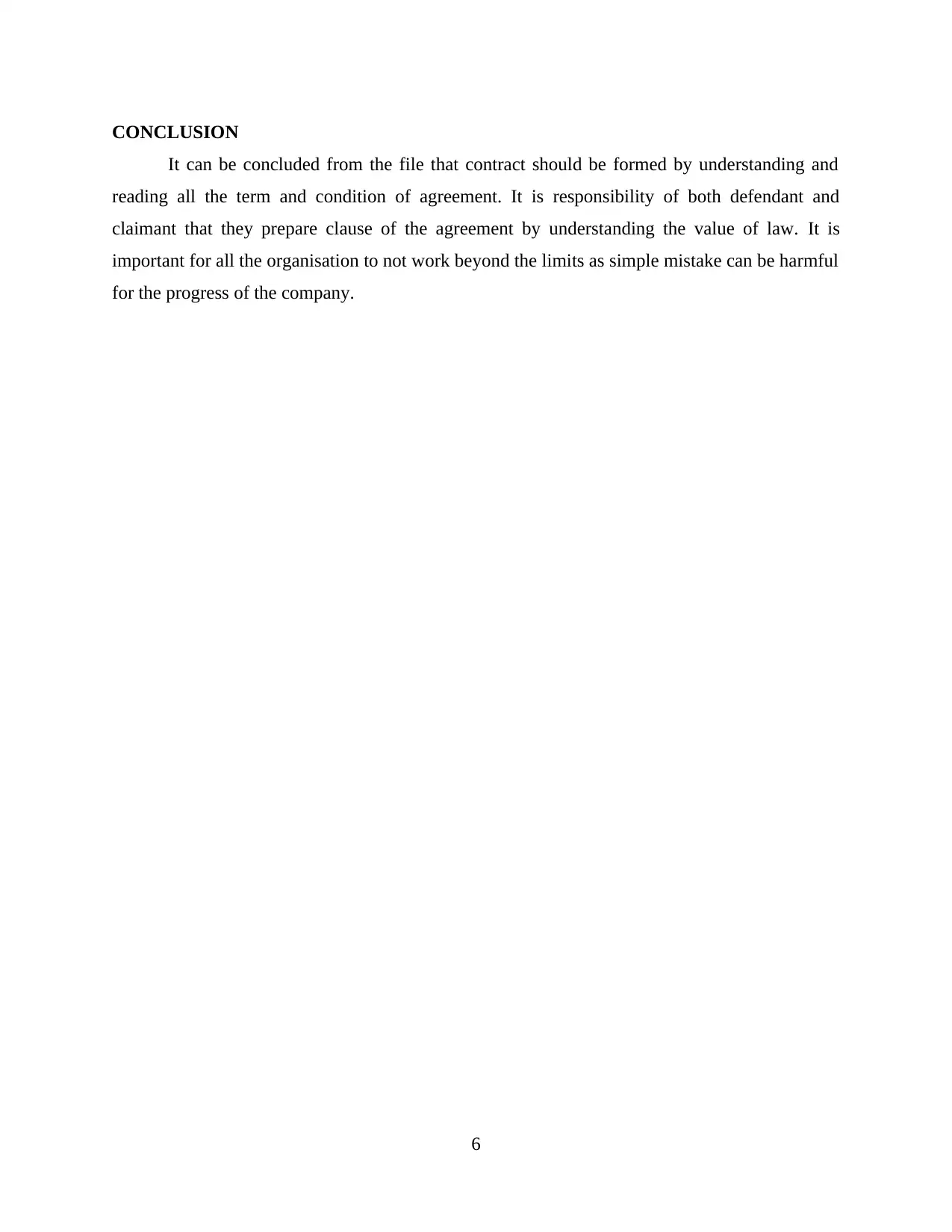
CONCLUSION
It can be concluded from the file that contract should be formed by understanding and
reading all the term and condition of agreement. It is responsibility of both defendant and
claimant that they prepare clause of the agreement by understanding the value of law. It is
important for all the organisation to not work beyond the limits as simple mistake can be harmful
for the progress of the company.
6
It can be concluded from the file that contract should be formed by understanding and
reading all the term and condition of agreement. It is responsibility of both defendant and
claimant that they prepare clause of the agreement by understanding the value of law. It is
important for all the organisation to not work beyond the limits as simple mistake can be harmful
for the progress of the company.
6
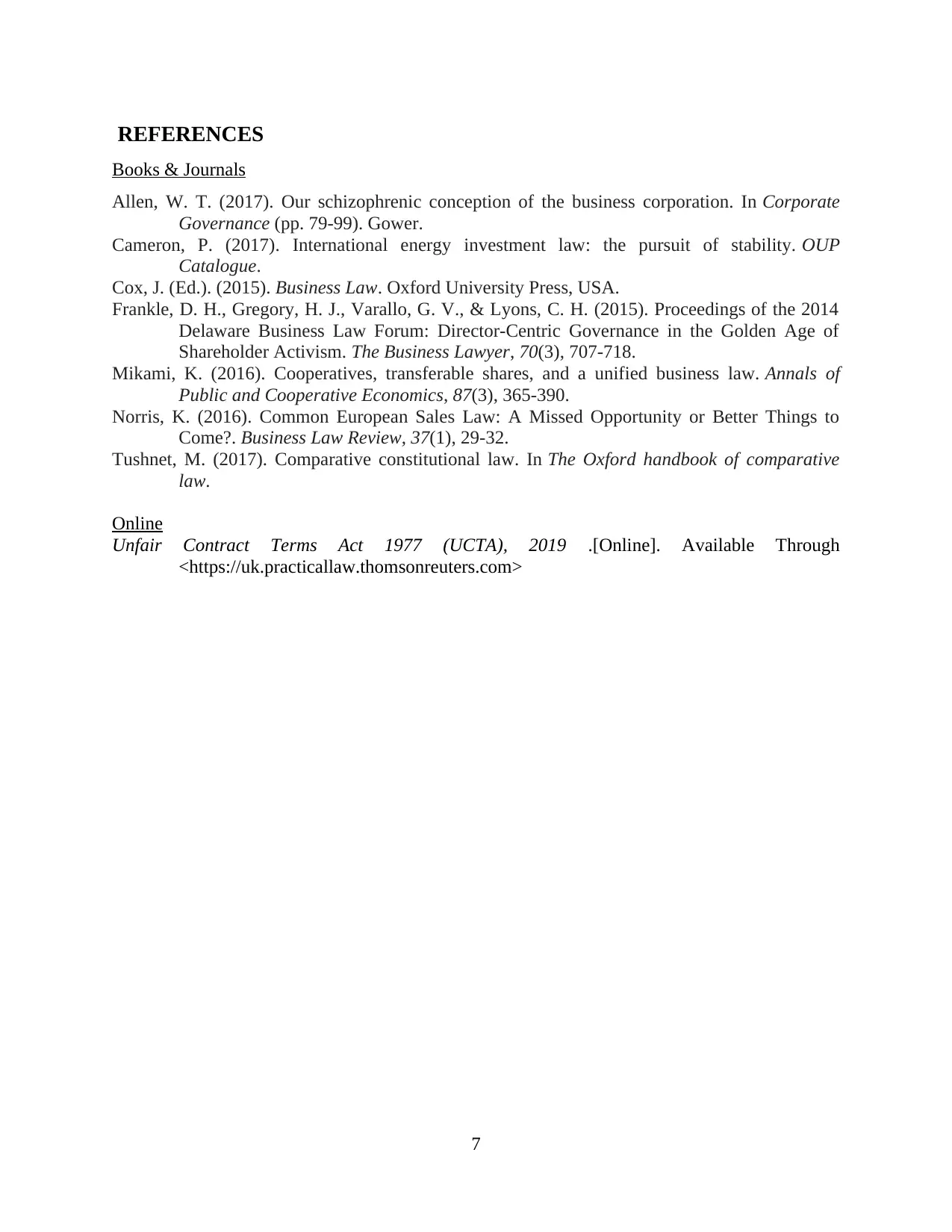
REFERENCES
Books & Journals
Allen, W. T. (2017). Our schizophrenic conception of the business corporation. In Corporate
Governance (pp. 79-99). Gower.
Cameron, P. (2017). International energy investment law: the pursuit of stability. OUP
Catalogue.
Cox, J. (Ed.). (2015). Business Law. Oxford University Press, USA.
Frankle, D. H., Gregory, H. J., Varallo, G. V., & Lyons, C. H. (2015). Proceedings of the 2014
Delaware Business Law Forum: Director-Centric Governance in the Golden Age of
Shareholder Activism. The Business Lawyer, 70(3), 707-718.
Mikami, K. (2016). Cooperatives, transferable shares, and a unified business law. Annals of
Public and Cooperative Economics, 87(3), 365-390.
Norris, K. (2016). Common European Sales Law: A Missed Opportunity or Better Things to
Come?. Business Law Review, 37(1), 29-32.
Tushnet, M. (2017). Comparative constitutional law. In The Oxford handbook of comparative
law.
Online
Unfair Contract Terms Act 1977 (UCTA), 2019 .[Online]. Available Through
<https://uk.practicallaw.thomsonreuters.com>
7
Books & Journals
Allen, W. T. (2017). Our schizophrenic conception of the business corporation. In Corporate
Governance (pp. 79-99). Gower.
Cameron, P. (2017). International energy investment law: the pursuit of stability. OUP
Catalogue.
Cox, J. (Ed.). (2015). Business Law. Oxford University Press, USA.
Frankle, D. H., Gregory, H. J., Varallo, G. V., & Lyons, C. H. (2015). Proceedings of the 2014
Delaware Business Law Forum: Director-Centric Governance in the Golden Age of
Shareholder Activism. The Business Lawyer, 70(3), 707-718.
Mikami, K. (2016). Cooperatives, transferable shares, and a unified business law. Annals of
Public and Cooperative Economics, 87(3), 365-390.
Norris, K. (2016). Common European Sales Law: A Missed Opportunity or Better Things to
Come?. Business Law Review, 37(1), 29-32.
Tushnet, M. (2017). Comparative constitutional law. In The Oxford handbook of comparative
law.
Online
Unfair Contract Terms Act 1977 (UCTA), 2019 .[Online]. Available Through
<https://uk.practicallaw.thomsonreuters.com>
7
⊘ This is a preview!⊘
Do you want full access?
Subscribe today to unlock all pages.

Trusted by 1+ million students worldwide
1 out of 9
Related Documents
Your All-in-One AI-Powered Toolkit for Academic Success.
+13062052269
info@desklib.com
Available 24*7 on WhatsApp / Email
![[object Object]](/_next/static/media/star-bottom.7253800d.svg)
Unlock your academic potential
Copyright © 2020–2026 A2Z Services. All Rights Reserved. Developed and managed by ZUCOL.





